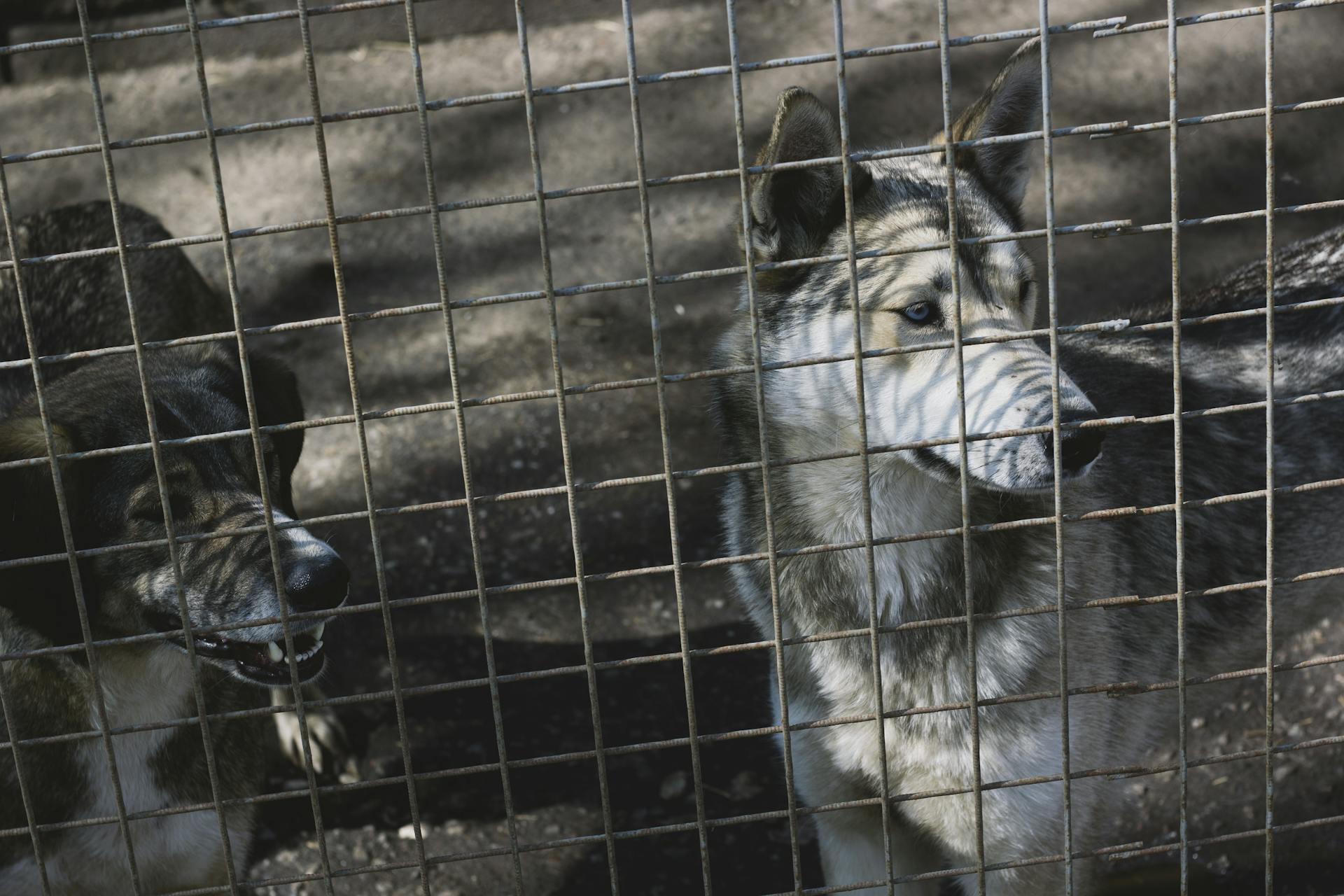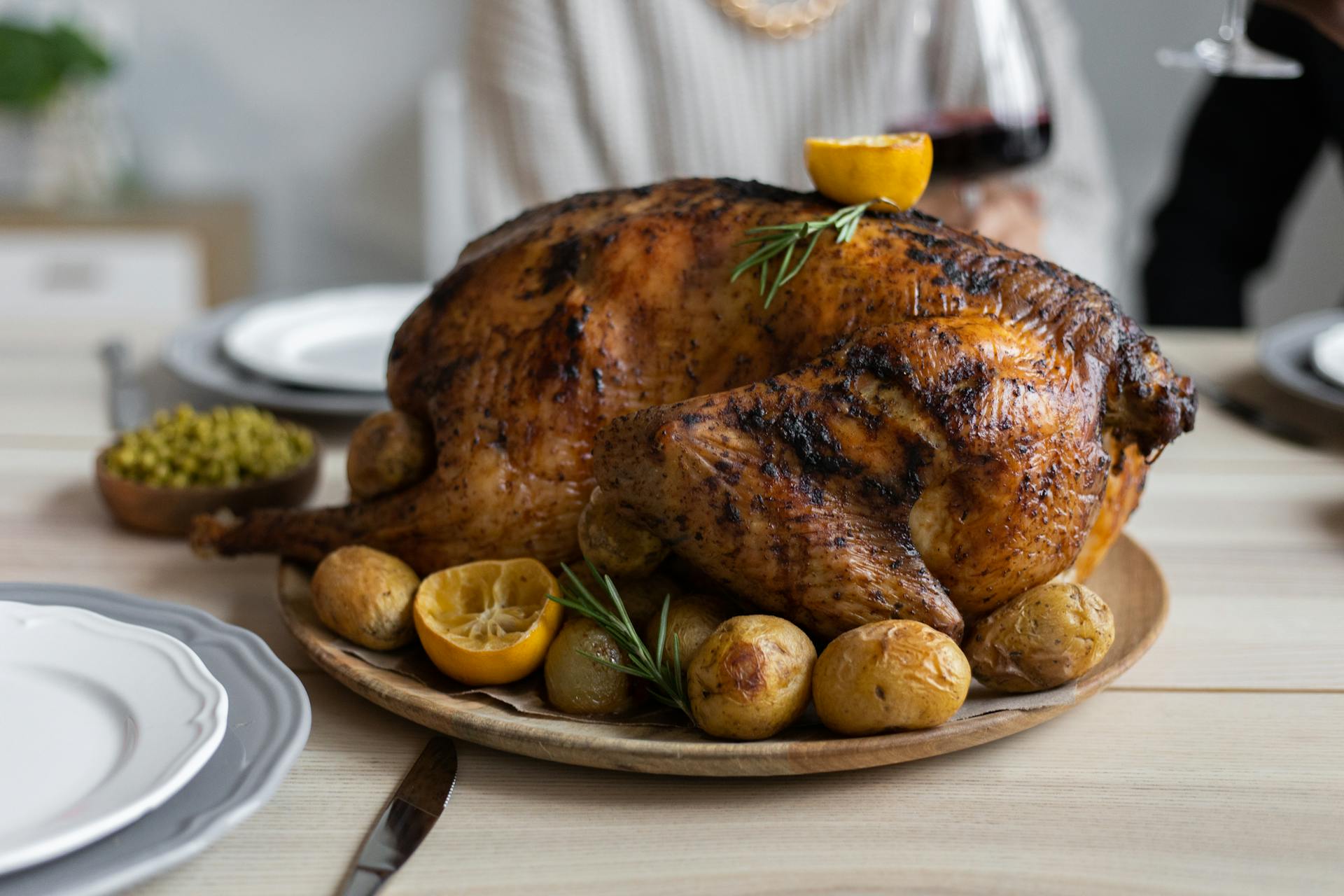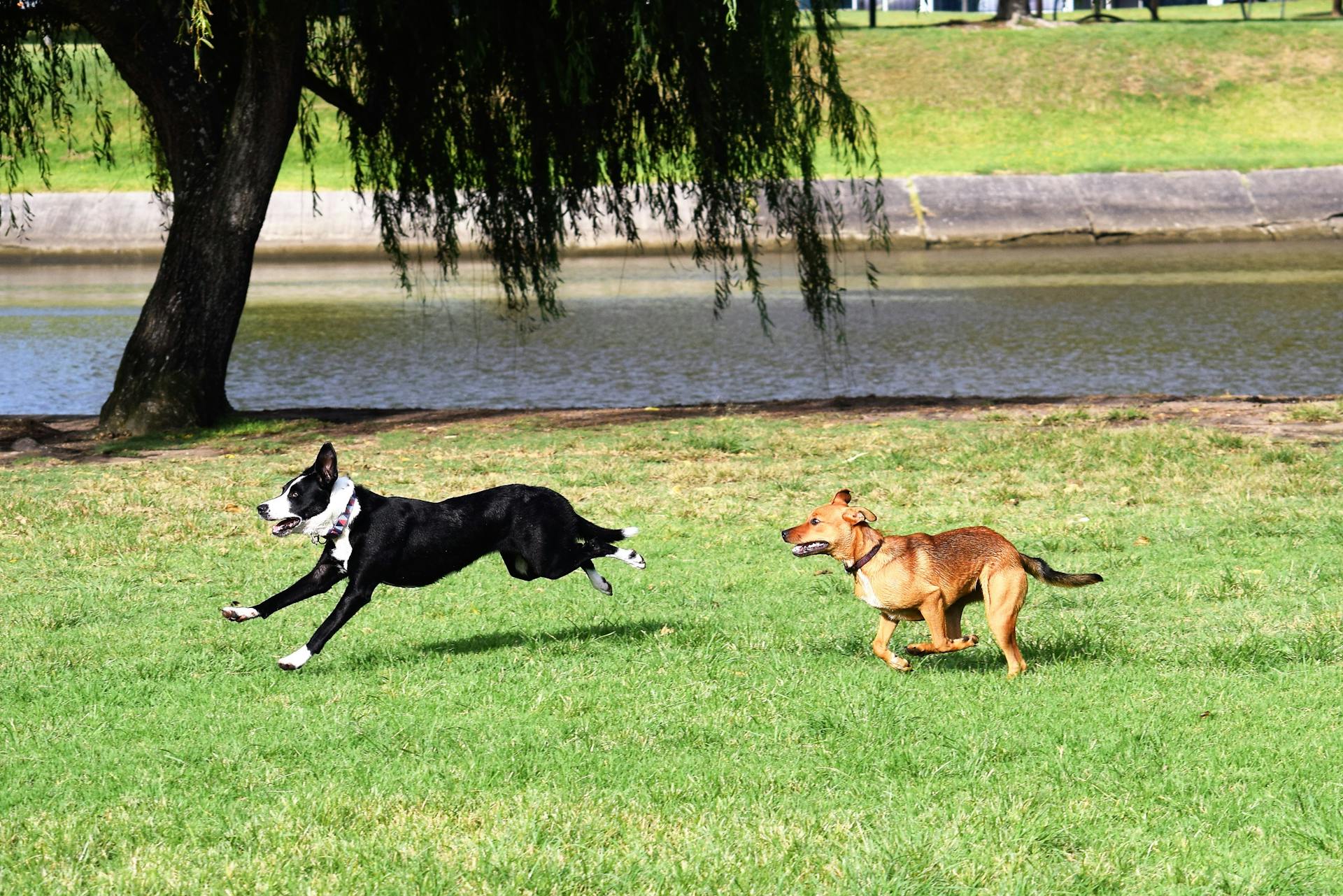
Dogs can have turkey meat as an occasional treat, but it's essential to do it safely.
Turkey is a lean protein, which is a good thing for dogs, as it's lower in fat and calories compared to other meats.
However, dogs can be sensitive to certain components of turkey, such as the skin and bones, which can cause digestive issues if not removed properly.
To make turkey a healthy treat for your dog, always remove the skin and bones and choose a plain, unseasoned variety.
Can Dogs Have Turkey Meat?
Turkey is safe for dogs to eat, but it's essential to prepare it properly.
The nutrients in turkey like protein, riboflavin, and phosphorus make it a great addition to a homemade dog food diet.
With veterinarian supervision, turkey can be a beneficial part of your dog's diet.
Don't feed your dog marinated and seasoned turkey, as it can cause digestive issues or pancreatitis.
Turkey should be freshly prepared, following proper safety procedures, to avoid preservatives and chemicals that dogs can't digest.
Guidelines for Feeding
Feeding your dog turkey can be a nutritious and delicious addition to their diet, but it's essential to do it safely. Only feed your dog turkey meat, as garlic can be harmful in large doses and onions are toxic to dogs.
To ensure your dog's safety, remove any bones from the turkey meat, as poultry bones are hard and small, making them a choking hazard.
When introducing turkey into your dog's diet, start with small amounts and gradually increase the portion size. You can also consult with your veterinarian to determine the best way to incorporate turkey into your dog's meal plan, especially if they have a health condition like diabetes.
Stick to lean meat, as dark meat is higher in calories and fat, which can be harder for your dog to digest. Remove the turkey skin and bones, as they can cause digestive issues.
Serving plain and unseasoned turkey is the best way to go, as salt and dressings can be toxic to dogs. Cook the turkey thoroughly before giving it to your dog, as raw turkey can increase the risk of food poisoning from bacteria like salmonella.
Here's a rough guide to the estimated amounts of turkey based on your dog's weight and calorie needs:
Remember, turkey should only be given as an occasional treat or added to your dog's food, and should not exceed 10 percent of their daily calorie intake.
Safely
Safely feeding your furry friend turkey meat requires some attention to detail. Only feed your dog turkey meat, as garlic and onions can be toxic to them.
To avoid any potential harm, discuss the possibility of including food scraps in your dog's diet with your veterinarian, especially if your dog has a health condition like diabetes.
When handling raw turkey meat, make sure it's fresh and wash it thoroughly before serving. Cooked turkey is also a safer option, as raw food can increase the risk of food poisoning from bacteria like salmonella.
To store raw meat safely, keep it in the freezer until you're ready to use it, and make sure all surfaces and objects that come into contact with it are clean and disinfected.
Here are some estimated amounts of turkey based on your dog's weight and calorie needs:
If you're unsure about how much turkey to feed your dog, it's best to consult with your veterinarian.
Cooking and Preparation
Adding cooked turkey to your dog's diet can be beneficial, but it's crucial to get it right. It takes more than just a piece of deli meat or mixing some turkey into their kibble to get the full nutritional benefit.
To ensure your dog gets a well-balanced complete meal, work with your veterinarian or a nutritionist. They will help you create a balanced diet.
Poultry is a breeding ground for bacteria like salmonella and listeria, which can make your dog seriously ill. Cook the turkey to a safe temperature of 165° Fahrenheit to avoid this risk.
Explore further: Just Food for Dogs Balanced Remedy
Use Cooked
Cooked turkey is a must for your furry friend. According to Dr. Dan Su, a Board Certified Veterinary Nutritionist, turkey must be cooked to a safe temperature to avoid bacterial risks like salmonella and listeria.
The USDA recommends cooking turkey to 165° Fahrenheit to ensure food safety. This is crucial to prevent your dog from getting seriously ill.
Discover more: Cooked Food Diet for Dogs

It's also essential to avoid raw food diets, as they pose a significant risk to your dog's health.
Cooking ground turkey is a great way to incorporate it into your dog's diet. You can choose from different lean-to-fat ratios, such as 99% lean, 93% lean, or 85% lean, depending on your dog's health needs.
If your dog has gastrointestinal issues, a veterinarian might recommend a homemade diet of boiled chicken and rice. You can use 99% lean ground turkey as a substitute for chicken.
To prepare cooked turkey for your dog, it's best to cook it on the stovetop or in the oven to ensure it's cooked all the way through.
Recommended read: Cooked Meat for Dogs
Other Cookable Ingredients
Let's talk about other cookable ingredients you can use with turkey. Some ingredients are harmless to your dog, while others can be toxic.
Onions and garlic are two ingredients that are commonly used in cooking, but they can be very bad for your dog if they're consumed in large amounts. This is because they belong to the Allium family and contain a compound that can cause anemia in dogs.

Some ingredients, like carrots and green beans, are perfectly safe for your dog to eat. These veggies are low in calories and rich in fiber, making them a great addition to your dog's meal.
Turkey is a great protein source, but it's not the only ingredient you can use to make a healthy meal for your dog. Other protein sources like chicken and fish can be cooked and served alongside turkey.
Asparagus and sweet potatoes are two other ingredients that are safe for your dog to eat. Both are low in calories and rich in nutrients, making them a great addition to your dog's meal.
For your interest: My Great Pyrenees Won't Eat
Nutrition and Health
Turkey is a nutritious addition to a dog's diet, providing protein, riboflavin, and phosphorus. It's essential to choose fresh, unprocessed turkey to avoid digestive issues or pancreatitis in your canine.
Feeding your dog turkey meat is safe, but be cautious of marinated and seasoned turkey, as well as butter or oils. These can cause digestive problems or pancreatitis.
On a similar theme: Can Turkey Cause Pancreatitis in Dogs
Turkey is a lean and high-protein food, making it an excellent source for muscle development, repair, and overall growth in dogs. A 1-pound serving of turkey contains approximately 900 to 1,050 calories.
To safely feed your dog turkey, remember to only provide the meat, avoiding bones and seasonings. It's also crucial to discuss the possibility of including food scraps in your dog's diet with your veterinarian, especially if your dog has a health condition like diabetes.
What Is Meat?
Meat is a fantastic source of protein for your dog, with turkey being a particularly good option due to its lower caloric and fat content compared to chicken.
Turkey is delicious and easy to digest, making it a great choice for your furry friend.
Turkey meals can be prepared in two ways - fresh or dry, with fresh turkey meals offering a more natural and unprocessed option for your dog.
Dry turkey meals, on the other hand, are often more convenient and have a longer shelf life.
Turkey is a nutrient-rich food that can provide your dog with the energy they need to stay active and healthy.
Worth a look: Fresh Meat for Dogs
Nutritionally Balanced Key to Pet Health
A well-balanced diet is crucial for your furry friend's overall health. Nutritionally balanced food should include the right ratios of lean protein and organ meat. This is especially important for dogs who may develop allergies to common commercial food ingredients.
According to Su, a trusted dog food company, JustFoodForDogs formulations ensure that your pet gets the right nutrients without worrying about overdoing it on certain vitamins or nutrients. With their range of options featuring turkey as the main ingredient, you can rest assured that your dog is getting a balanced diet.
Turkey is a novel protein that can be beneficial for dogs who have allergies to common ingredients like chicken. It's high in protein, which is essential for muscle development, repair, and overall growth in dogs. A high-protein diet can also help your dog feel full and satisfied.
Here are some of the key benefits of a nutritionally balanced diet for your pet:
- Essential nutrients in the right ratios
- Lean protein and organ meat for optimal health
- Reduces the risk of allergies and digestive issues
- Helps maintain a healthy weight and overall well-being
Remember, it's always best to consult with your veterinarian before making any changes to your dog's diet. They can help you determine the best course of action for your pet's specific needs and health conditions.
Are Tendons Ok?

Turkey tendons can be tricky for dogs, presenting a choking concern if the pieces are too big.
Not all parts of the turkey are safe for dogs, and turkey tendons in particular can be difficult to eat and swallow.
If the pieces are too big, they can be a choking hazard, just like bones.
Turkey tendons are best avoided if you want to keep your furry friend safe.
You might enjoy: Turkey Tendons Good
Guidelines and Labels
Feeding your dog turkey can be a great way to add some variety to their meal plan. Human food like turkey is rich in vitamins, minerals, and amino acids.
To make turkey a balanced part of your dog's diet, it's essential to do more than just sneak them a small piece of turkey on Thanksgiving. You want the turkey to be a part of their daily calories, not a treat on top of their existing meals.
There are plenty of ways to incorporate turkey into your dog's meal plan, from home-cooked recipes to commercial dog foods that feature turkey as an ingredient. This can be a great way to mix things up and provide your dog with some extra nutrition.
To ensure you're making informed decisions about your dog's food, it's crucial to learn how to read dog food labels. You can do this by looking for specific ingredients, such as turkey, and understanding what they mean for your dog's diet.
What to Do If You Swipe
If your dog gets a bite of turkey, a small amount is probably fine, but be aware of the bones which can be a choking hazard.
You should keep in mind that there are many other holiday foods that are bad for your pet to consume, including desserts with xylitol and salads topped with grapes or raisins.
Save the ASPCA Poison Control Center hotline (888) 426-4425 in your phone just in case of an emergency.
Frequently Asked Questions
Can dogs eat turkey breast slices?
Yes, plain unseasoned turkey breast slices are a healthy treat for dogs. However, always check with your vet first to ensure it's safe for your dog's specific needs.
Is turkey hard for dogs to digest?
Yes, turkey can be hard for dogs to digest, especially if it contains skin or fatty portions, which can lead to digestive issues like upset stomach or diarrhea.
Can German shepherds eat turkey bacon?
German Shepherds should not eat turkey bacon due to its high fat and salt content. Opt for healthy dog treats instead for a nutritious and safe snack.
Can French bulldogs eat deli turkey?
While deli turkey can be a treat for some dogs, French Bulldogs may not be ideal candidates due to potential additives and high sodium content. Consider roasted or baked turkey breast as a healthier alternative, but in moderation.
What if my dog ate some Thanksgiving turkey?
If your dog ate Thanksgiving turkey, monitor them for diarrhea, vomiting, fever, low energy, difficulty breathing, and bleeding, and contact a veterinarian immediately if you notice any of these symptoms. Seek veterinary attention right away to ensure your dog's health and safety.
Sources
- https://www.petcubes.com/blogs/turkey-dog-food/is-turkey-meat-good-for-dogs
- https://veterinaryemergencygroup.com/blog/can-dogs-eat-turkey/
- https://www.dailypaws.com/dogs-puppies/dog-nutrition/what-can-dogs-eat/can-dogs-eat-turkey
- https://www.justfoodfordogs.com/blog/can-dogs-eat-turkey-the-ultimate-guide.html
- https://be.chewy.com/can-dogs-eat-turkey/
Featured Images: pexels.com


